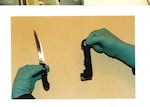
Detectives from the Salem Police Department examine evidence outside Harriet Thompson's home on March 20, 1998. Jesse Johnson was convicted and sentenced to death for Thompson's murder in 2004.
Documents obtained via public records request / OPB
After spending six years awaiting trial, a jury in Salem convicted Jesse Johnson in 2004. Prosecutors relied on an alleged confession to the murder of Harriet Thompson that Johnson made to a fellow drug user named Donald “Shorty” Blocker.
But the jury did not hear the full story. If they had, they may have had doubts about the police investigators at the heart of the Johnson case: Detectives Craig Stoelk and Mike Quakenbush.
Listen to all episodes of the “Hush” podcast here.

Rings collected by Salem police during the investigation into Harriet Thompson's murder in 1998. Detectives developed a theory that Jesse Johnson killed Thompson to steal costume jewelry from her and sell it for drugs.
Documents obtained via public records request
EPISODE TRANSCRIPT:
Leah Sottile: Before we get started: This podcast contains graphic descriptions of violence. Keep that in mind in choosing when and where to listen.
Spencer Todd: They’re setting up our table. Five-ish minutes.
Ryan Haas: Oh, five minutes. OK.
Sottile: Jesse Johnson had only been out of jail for about an hour. It was the first time in nearly 25 years he had seen the outside, and his lawyers were taking him to a fancy first meal.
Lynne Morgan: I’m thrilled to be standing outside, about to have dinner with Jesse Lee Johnson – in a restaurant.
Sottile: This day had been a whirlwind. Johnson woke up at 2:30 in the morning and went to his job in the jail laundry. After his shift, he played some dominos, watched TV. His new trial, which he had been granted in 2021, was always on his mind.
A little after 4:00 pm, his attorney Lynne Morgan called him, told him the news: He was getting out … today. He hung up the phone, went back to his cell and cried.
We had just seen Johnson walk out of jail after prosecutors dropped murder charges against him. As we stood outside the restaurant waiting for a table, it was clear he was ready for someone to finally listen to his side of the story. He said his original attorneys back in 1998 did not.
Jesse Johnson: I think they made a deal with the DA. I’ve been telling everybody that. If they wouldn’t contest the state’s case, that they would give me a plea deal. And if I would’ve been guilty, it would’ve been a good strategy, but I wasn’t, so I couldn’t take it.
Sottile: What did it mean if you took that?
Johnson: I’d have had to plead guilty to something I didn’t do.
Sottile: What would that mean to you to say that you did something you didn’t do?
Johnson: That would’ve been rough. That would’ve been rough because the life that I was living, it wasn’t an honest living, but I wasn’t hurting anyone – physically hurting anyone. And I was trying to straighten up my life and then this happens.
Sottile: Outside the restaurant, Johnson’s attorney Rich Wolf said there were easier ways to get here.
In 2021, after Johnson’s original conviction was overturned, prosecutors did offer him a deal. Johnson just had to admit guilt for killing Thompson, and they’d let him go. Rich thought that was a good offer for a man who’d spent decades in prison.
Rich Wolf: And he said, no, I can’t think about that. I can’t do that deal. So yeah, that takes a lot of fortitude. What guilty person would turn down that deal to have been out of jail months ago? None that I know.
Sottile: Johnson’s decision not to take that deal is something we’ve thought a lot about. If he’s innocent, he’s lost a lot of life because he simply refused to say he did anything wrong.
Inside the restaurant, more lawyers showed up, clapped Johnson on the back. This was a huge legal win. But for Johnson, it was the beginning of a new life.
For his first meal as a free man, he ordered stuffed salmon with asparagus, rice and a coke. Johnson ate slowly, sipped his drink, barely said a word. Everything was a blur around him. As he sat there, it was almost hard to believe so much controversy had swirled around this one man. How was it exactly that he got in all of this trouble?
From Oregon Public Broadcasting, this is Hush. I’m Leah Sottile. This is episode two: Shorty.
The morning after Jesse Johnson got out of jail, producer Ryan Haas and I met him and his attorney Lynne Morgan at his hotel room.
He jumped on the bed that first night, could barely sleep – every sound, every shadow felt so new and strange. He was still figuring out things most of us take for granted, like how to use a cellphone.
Sottile: It looks like you’re getting text messages.
Johnson: I’m getting text messages. I ain’t checked no messages since I had that phone.
Sottile: I was also still figuring him out.
Sottile: Oh, nice. Oh, look at the emojis. Those little pictures are called emojis.
Johnson: Yeah.
Sottile: Did you know that?
Johnson: Yeah.
Sottile: Oh, you did?
Johnson: Yeah.
Sottile: Oh, I didn’t know. How do you know about emojis?
Johnson: Yeah, I knew. They talked about em’ in prison. 20/20. I told you I stay on 20/20 all the time.
Sottile: Oh, on 20/20, the show?
Haas: The TV program.
Sottile: When I asked Johnson about his case, he talked for 40 minutes straight. He told us about meeting Harriet Thompson sometime in early 1998. She was one of the only Black women he’d seen in Salem. And when they met, he handed her his address book to write in her information. Later, he couldn’t find her name.
Johnson: I got Harriet’s information as Sunny.
Sottile: But there was no Sunny in his address book. There’s contention over whether or not she wrote her name under the Hs for Harriet or the Ls for Laverne. But all Johnson remembers is that her name wasn’t under the Ss for Sunny.
This confusion over Sunny … or Harriet … or Laverne … it seems like everyone around her knew her as something different. But back in 1998, Johnson only knew that they both liked crack.
On March 19th, 1998, he was at her apartment. This is the day before someone stabbed her to death. From what we found in documents, Thompson was relapsing by that date, when Johnson asked if she could make a connection between him and her dealer.
Johnson: I called her and she said, yeah, he was coming, should be there about 5:30 or 6:00. So I went to her house.
Sottile: They made a deal. He would come to her apartment, use cash to buy crack and give her a small cut of the drugs for that introduction to her dealer – the guy called D’Loc. D’Loc came over with a white guy named Fred. When they arrived, Johnson waited quietly in the kitchen. Then he stepped out and it surprised them.
Johnson: Both of ‘em didn’t know I was in the house, so they were kind of spooked. I told him, no, I was looking for a plug. And he served the $40 worth of crack. Then he left.
Sottile: Johnson bought small amounts of drugs all the time. He was mostly homeless at that time, slept on couches or under a bridge overpass. And he’d work an odd job to get some money, or break into cars and steal things he thought could pawn or trade for drugs. That day, on March 19th, Thompson noticed the money in his billfold.
Johnson: She asked me to loan her some money and I told her, “No, I don’t loan money out.” I said, “What you got to pawn?” And she said, “Nothing.” Then she said, “Oh, I got something you might be interested in.” And she went and got some costume jewelry.
Sottile: She pressed Johnson to take the jewelry in exchange for some cash – promised she would pay it back later.
Johnson: I gave her 27 bucks. She gave me like $60 worth of costume jewelry, a couple of fake gold necklaces and about four or five rings. I took ‘em and a pair of earrings.
Sottile: This 60 bucks of jewelry and this encounter with D’Loc were essentially a death sentence for Johnson. D’Loc would tell the police he saw a Black man at Thompson’s apartment the day before her murder. They showed him all those mugshots of Black men in Salem. That was how the detectives first took an interest in Johnson as the potential killer. And that ended up being the story detectives and prosecutors used to convict Johnson. He killed Thompson for her jewelry so he could buy drugs.
I want to spend a minute explaining why this jewelry mattered so much in this case. Prosecutors emphasized the emotional value of this jewelry. We give people rings to show them we love them. A mother passes her earrings to her daughter as a family heirloom. But the jewelry in this case isn’t the kind you’d keep locked in a safe. It was costume jewelry. It wasn’t worth much, but it could get someone their next fix.
Records show that Thompson stole jewelry just like it from a local department store. This kind of jewelry was one kind of currency in the drug world. So did CB radios and car stereos. They were all things that could be exchanged to get drugs.
Sottile: Was that pretty common? Everybody was just sort of swapping things or selling things so that they could get money?
Johnson: Yeah. That was pretty common because they were in the drug scene and there was a lot of thieving going on. Some of it – I probably had three or four of the same kind. It was just costume jewelry. It was sterling silver rings with fake diamonds and pearls or whatever.
Sottile: Johnson said he didn’t expect to get his money back from Thompson. He’d just met her. So almost as soon as he left her apartment, he was trying to offload that jewelry. He even gave one pair away to a woman he was hitting on.
The next day – March 20th, 1998 – as Salem police were trying to understand who killed Thompson, Johnson was a few miles away, looking to get some cash or drugs for a whole backpack of stolen stuff he had. He ran into his friend Stacy Satter at a city park, where she was pushing her bike as she walked. Johnson asked her if she knew anyone who might be able to sell some of his stuff.
Johnson: I gave them to Stacy and told her to get rid of them, and we’d split the proceeds of whatever she got for ‘em.
Sottile: Satter suggested they talk to a very tall guy named Donald Blocker. Ironically, he went by the nickname “Shorty.” Johnson didn’t know the guy, but he agreed to meet him. Satter, Johnson and Shorty managed to score some drugs that day after a few tries at selling some of the jewelry.
After Thompson was killed, detectives sifted through the stories of drug users they swept up for questioning, trying to separate truth from fiction. They heard rumors about Johnson. He was selling jewelry that belonged to the victim. So they started looking for Satter and Shorty.
After the news of the murder, Shorty fled to Washington state. He heard people were getting swept up. He also had an outstanding warrant for a probation violation over drug charges. When detectives Stoelk and Quakenbush tracked him down in Washington, he told them the story of running into Johnson and Satter.
Craig Stoelk: OK, so you see him, and what kind of conversation do you have?
Sottile: That’s Craig Stoelk asking questions.
Donald “Shorty” Blocker: He said he had some jewelry that he wanted to either sell or trade.
Stoelk: OK. And did he show it to you?
Shorty: Yeah, he gave me something to go and sell.
Stoelk: OK. What things did he show you?
Shorty: He showed me rings, necklaces, watches and it looked like a police CB or …
Stoelk: … a cellphone, or a walkie-talkie, or something?
Shorty: Walkie-talkie. Like you guys got the radios. Had one of them mics on it.
Sottile: As police grilled him, Shorty made an explosive accusation.
Stoelk: Did he say where he got the backpack?
Shorty: He didn’t say.
Stoelk: OK. And he said he had this jewelry. Did he say where he got it?
Shorty: He said that he spent the night with this broad and that he robbed her for her jewelry.
Stoelk: OK, and what happened during that?
Shorty: He said that he offed the bitch.
Stoelk: He offed her?
Shorty: He offed her.
Stoelk: OK. And that’s how he said it – “he offed the bitch”? OK. And did he say why he …
Mike Quakenbush: Is that a yes?
Sottile: That’s Mike Quakenbush there.
Quakenbush: Because when you shake your head the tape recorder can’t pick that up.
Shorty: Yes.
Sottile: Shorty said Johnson told him he “offed the bitch” for her jewelry.
Stoelk: And when he is telling you this, is he looking you right in the eye and saying it?
Shorty: Yes, he was.
Stoelk: OK. Did he act nervous or concerned about saying that?
Shorty: Not at all.
Stoelk: OK. Did he tell you how he did it, whether he shot her or stabbed her?
Shorty He didn’t say, and I didn’t ask.
Stoelk: OK. This jewelry and stuff, did you see anything on it that would make you think that that was true? Did you see any blood on anything?
Shorty: Nope.
Sottile: This interview you just heard? This would be the keystone of the prosecutors’ case against Jesse Johnson. They told the jury that the “offed the bitch” comment was a confession to Thompson’s murder.
The detectives pressed Johnson over this when they finally arrested him on March 27 at his girlfriend’s house, just a week after Thompson was found. Here’s Johnson explaining it to us in his hotel room.
Johnson: He asked me, was Shorty lying or something of that nature. I said, I don’t even know Shorty. But I was already like, I don’t know what you’re talking about. Basically everything he said, because I wasn’t answering nothing he was saying. I didn’t even want to talk to him.
Sottile: This reliance on Shorty as a key witness has always struck us as strange. During Johnson’s trial, a prosecutor asked Stacy Satter, “Did you ever hear him say anything about doing anything violent? Anything about offing the bitch?” She was unequivocal. “Absolutely not,” she said on the stand. But it was Satter’s word against Shorty’s, or, to use the prosecutor’s words, “one drugger, one doper to another.” We couldn’t talk to Shorty because he died in 2018. And we’ve knocked on countless doors in Salem trying to find Satter, but couldn’t.
The other reason it’s so strange prosecutors hung their case on Shorty is, he was a lot like Johnson – homeless, drug user. The only difference was he had been a petty criminal in Salem way longer than Johnson had. And one thing that hasn’t changed much between 1998 and today is that if you’re homeless or a drug user, police and prosecutors pretty much treat you as an unreliable person. So why believe Shorty – and not Stacy Satter?
After talking to Johnson that first full day of his newfound freedom, we realized that if we were going to understand what happened in 1998, we needed to get to know the detectives involved. When we read the documents from this case, we were surprised to learn that Salem police did not have a warrant when they arrested Johnson, but they took his belongings anyway.
Johnson: They took my clothes and my shoes, and they didn’t have any shoes.
Sottile: And you had what, like a hospital-type gown on?
Johnson: No, it’s just like a little paper suit, like a painter’s suit that’s made outta paper.
Sottile: Johnson said Stoelk and Quakenbush paraded him into the Salem hospital essentially naked, and without shoes. They drew his blood for a DNA test and took photographs of scratches on his penis. At the station, they asked him about Harriet Thompson, about drug houses.
Johnson: I wasn’t denying I was ever there. They just said drug houses. What drug houses have you been to in Salem? I said, I haven’t been to no drug houses. I didn’t know if it was a drug house or not.
Sottile: The detectives asked Johnson questions about Thompson’s murder, about stolen jewelry. And to each question, Johnson answered, “I don’t know what you’re talking about.”
The detectives took it as a sign of guilt because they knew he had been at her place before.
Johnson: He made the statement that he was putting a murder charge on my Black ass so we didn’t have to come to Arkansas to get you.
Sottile: Who said that?
Johnson: I think it was Quakenbush, and I said, “Oh, that’s the way y’all do it here in Oregon.” He said, yep. He said, the little white lie that I tell is going to get your Black ass sent to prison.
Sottile: If you only read the newspaper reports on this murder, it might have seemed like an open and shut case. But we’d quickly find out that’s an image that’s as easy to chip as a fake diamond.
The prevailing narrative in Jesse Johnson’s case for 25 years has been whatever prosecutors and detectives say happened.
When detective Quakenbush sat down with us at a Salem diner to explain this case, he told a story we already knew from reading the transcript of Johnson’s trial. You heard that last episode: Johnson was a drug user, eager for an easy fix – and that led to a murder. He was a thief and he was a liar.
Quakenbush: He knew where he was and he knew who she was, and that’s my belief. Based on, again, what we’ve talked about – his provable lies, the things that he said to Blocker, the jewelry that he sold, his print being there. Again, you don’t go to that length to distance yourself from just stealing some costume jewelry.
Sottile: I knew that if we were ever going to be as sure as the detectives, we needed to see everything in the police file. All the original interviews, the prosecutors’ notes. If there was anything wrong with the investigation, it seemed like we’d be able to find it.
So, long before Johnson was ever let out of jail, Ryan and I began filing records requests with any agency that might have touched this case. But we ran into issues almost immediately.
Ryan Haas: Hello?
Sottile: Hi, I’m actually recording this phone call.
Haas: Oh, all right.
Sottile: So, what the fuck is with these records?
Sottile: The first time we tried to get the investigative files, the Salem police flat out told us “no.” They said it was an ongoing investigation. But after prosecutors dropped the charges against Johnson and the jail released him, the police couldn’t really use that reason anymore. They didn’t have any other suspects.
So we pushed back, and then they said it would cost thousands of dollars for the police to turn over the file – a public record, mind you.
Maybe that was meant to deter us, but we paid for the records. Then the police told us it would take a long time to give them to us because they had to review the files and redact people’s birthdays. To keep ourselves occupied, we filed more requests. When we’d get records back for smaller pieces of the puzzle, it was obvious we weren’t getting everything we asked for.
Sottile: I’m just trying to measure how outraged I should be.
Haas: I mean, it’s always hard to tell, right? Because it’s like you don’t know what you’re not getting until you have some other way of seeing that, right?
Sottile: Records we knew existed would turn up missing. It happened so often in these requests, Ryan and I started an ongoing debate. We called it “malice or incompetence.”
Sottile: Like when you sent me the thing this morning, I’m like, how come that’s not in here? We would have no idea. That’s crazy. I don’t know, it just feels crazy to me.
Haas: It’s very frustrating. I think, as a journalist you want to be thorough and make sure you’re not missing something, but we’re sort of relying on an agency like the Salem Police Department to do its due diligence and get us everything so we’re being informed
Sottile: We would spend hours checking what we got to make sure it was all there, and when we found holes, Ryan would follow up.
Teresa Waite: Hi Ryan, this is Teresa with Salem Police Records, returning your call.
Haas: Hey, thanks for calling me back.
Waite: Uh huh.
Sottile: OPB’s lawyers eventually had to get involved.
Haas: I don’t know if the city attorney reached out to y’all, but our lawyer realized that Oregon public records law actually doesn’t require exemptions for things over 25 years.
Teresa Waite: Possibly yes, but not all of the audio files are over 25 years old.
Haas: Mm-hmm.
Sottile: We knew we weren’t seeing the full picture. Here’s an example: During one interview with Lynne Morgan, Johnson’s attorney, we asked how credible Shorty’s testimony about the “offed the bitch” comment was. And she just casually said it wasn’t. In fact, he recanted his entire statement.
Morgan: That’s what Shorty says, yeah.
Sottile: Wow. I don’t think we knew that.
Haas: Is that documented?
Morgan: I think so. Yeah, I think on the tape for the defense investigator that interviewed him at the jail. I think … Do you have that tape?
Haas: I don’t think we have the tape.
Sottile: We don’t.
Haas: I think I’ve seen mention of it.
Morgan: OK. We have the tape.
Sottile: We didn’t think tape like this still existed. About a year after Johnson’s trial, a man distraught over his crumbling marriage drove his car up the stairs and straight through the front doors of the Marion County Courthouse in Salem. And the whole building caught on fire. Some men would rather burn a courthouse down than go to therapy, I guess.
Anyway, in the blaze thousands of records were lost – including all of the recordings of Johnson’s trial. At the trial, Marion County prosecutors still put Shorty on the stand, and he repeated the “offed the bitch” story. We could see in the written trial transcript that Johnson’s defense attorneys made mention of this tape of Shorty walking back his “offed the bitch” story. They even tried to play it in court for the jury, but when his attorneys pressed play … [music playing] … country music came out instead. Johnson’s attorneys told the judge that someone must have accidentally taped over Shorty recanting.
But sure enough, Lynne had the original tape. She sent us an email, and there it was. She didn’t even charge us for it. The quality of the recording is not great, but you’ll get the gist.
Jack Yarbrough: OK. Would you please state your full name [inaudible] …
Shorty: Donald Ray Blocker …
Sottile: This was recorded in December of 1998, eight months after Shorty originally told detectives that Johnson had “offed the bitch.”
An investigator from Johnson’s original defense team is the one asking the questions here. He tracked Shorty down in jail and asked him to tell the story again of when he ran into Johnson and Stacy Satter.
Yarbrough: Was this upper grade costume jewelry, or the cheaper stuff?
Shorty: This was cheap.
Yarbrough: OK.
Shorty: The CB radio was worth more than the jewelry.
Sottile: The investigator asked if the costume jewelry was expensive. Shorty said, no, the CB radio was worth more. After asking about the costume jewelry Johnson had, the investigator then asked if Johnson ever said anything about killing Harriet Thompson.
Yarbrough: Let me ask you the question again. At any time, did Jesse, from the time you first met him that evening, did he ever say anything about a homicide, or being involved in a homicide, or committing a homicide?
Shorty: No, he did not.
Yarbrough: OK.
Sottile: The tape is hard to hear, and yet his point is crystal clear. Shorty recanted his statement. When the investigator asked if Johnson said anything about killing Thompson, Shorty said no.
And Shorty went beyond that. He said the detectives in the case told him to lie.
Shorty: Quackenbush told me that if I answered the questions that he wanted to ask, if I answered them the way he wanted me to answer them, he would make sure no criminal charges were filed against me.
Sottile: Just in case you couldn’t understand that, Shorty says “Quakenbush told me that if I answered the questions the way he wanted me to answer them, he would make sure no criminal charges were filed against me.”
Even though they knew about this tape in 2004, when Johnson stood trial, prosecutors still put Shorty on the stand and said he was a trustworthy witness. He had recanted the “offed the bitch” story, but by the time he was on the stand, he was telling it again. And the jury never heard this tape during the trial.
The whole thing was just bizarre, and we had no choice but to wonder what else the Salem police and prosecutors weren’t telling the public. This case was old and the truth was buried away in files that we struggled to get our hands on.
Ryan and I went around and around on what was happening. Were Salem police keeping things from the public maliciously, or were they just incompetent? Time and again, attorney Lynne Morgan told us that the truth was there – but getting to it wouldn’t be easy.
Sottile: I think Ryan and I are always trying to figure out, in this case – in all things – where there’s incompetency and where there’s malice. How do you see the way the Salem police act?
Morgan: In this case, I think it’s a combination of being lazy and arrogant … and racist. And I think that once they decided that they were going to get Jesse Johnson for this crime, that everything they did went towards that, and there really were no boundaries. I mean, it kind of makes you wonder what they’ve gotten away with all their careers, that nobody’s ever pushed back against them? I don’t think it was incompetence.
Sottile: After hearing Shorty say that the police offered him a deal to answer questions the way they wanted, we wanted to know if there was any evidence that these detectives had been racist on the job. It seemed like it would be a while before we’d get any records, so we decided to start reporting around them to see what we could find out on our own. We found answers in unlikely interviews, and in an unexpected place I don’t think either of us thought we’d go to for this story. Where you can always eat good in the neighborhood: Salem’s local Applebee’s.
That’s next time.






